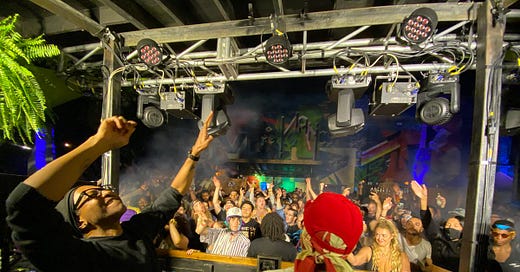Techno Make Detroit Go Round
Arena Show Snarl Up, SoundScan's Pop Overthrow, Spotify's Indie Initiative
Since the year 2000, Memorial Day Weekend in Detroit has meant the city’s annual techno festival—Movement. And while the event, which typically sees 35,000 daily attendance, has been in hibernation since COVID, this year saw a partial rebirth. A seedling that sprouted up between the cracks in the downtown pavement, with the promise of a return to normal that seems to be coming more quickly than anyone might have predicted.
The seed was sown a mere two weeks earlier, when event promoters Paxahau announced, Micro Movement, a four-day series of free events taking place at outdoor venues throughout the city. With a lineup representing multiple generations of Detroit talent—from local ’80s hero Bruce Bailey and founding techno legend Kevin Saunderson to ’00s standard bearer Matthew Dear and New Detroit rising star tylr_, it was a far cry from the top-billing global techno talent that typically attracts equally far-flung fans to Movement. But with international, er, movement still in flux, it’s clear that most of 2021 is going to feature artists that don’t require passports to perform.


As excitement steadily increased during the two week build-up to Memorial Day, livestreams were announced for those who could not attend Micro Movement, along with additional online sessions by long-running Movement afterparty brands Observe Scene (a collab between Detroit promoters Blankcode and Los Angeles techno movers like Drumcell that has been running since the mid-’00s) and No Way Back, which delivered its second annual 36-hour stream, this year honoring beloved community member Jasen Loveland who passed away mere days before the online festivities.
While the worldwide community of techno heads settled in for the all too familiar ritual of raving at home, events on the ground in Detroit revealed a city ready party IRL. Social media posts Friday through Sunday showed peeks of events outside the purview of Paxahau, from the recently re-opened Marble Bar to the insidiously underground Club Toilet. By the time our red-eye from LAX to DTW landed on Monday morning, it was clear that at least a few hundred sleepless locals were treating Micro Movement like the real deal, even if Hart Plaza remained fenced off from the public.
Starting with a private tour of the 20 Years of Electronic Music Festivals exhibit at the Detroit Historical Museum, where my 1999 article announcing the first DEMF hung proudly on the wall, the pre-pandemic vibes were in full effect as we arrived at the Alley Deck classic Detroit punk joint the Garden Bowl, one of Micro Movement’s three venues. Billed as “extremely limited capacity” and “mask required,” when it was announced mid-May, the later requirement became moot when Michigan rescinded its mask requirement for outdoor events a few days later. Therefore, smiling faces were on full-display as the summer sun beamed down on the deck overlooking Woodward Avenue.
As for capacity, this issue also felt irrelevant as the audience swelled at TV Bar while Al Ester dropped house-infused tracks that had the crowd of several hundred young and old partiers dancing like it was one of the backyard soirees where techno first found it’s form among 1980s Detroit high school cliques.
Through the crowd, we caught site of Paxahau co-founders Jason Huvaere and Jason Clark, along with talent buyer Chuck Flask and sound system guru Michael Fotais, all free from the usual demands of throwing a music festival and instead enjoying this rare Memorial Day Weekend unencumbered by a walkie talkie.
As we safely posted in the back of the courtyard, still struggling to feel fully comfortable with this new/old non-socially-distanced normal, it was thrilling to watch the audience around the DJ booth turn into a mass of moving bodies and waving hands as clouds of recently legalized cannabis wafted into the sky.
At midnight, June 1st, as Matthew Dear dropped the first record of his set to wrap up Micro Movement, Michigan officially began allowing full capacity for all outdoor events (indoor venues are expected to follow on July 1st). As the baby steps towards reopening begin the look more like leaps, its seems evident after this weekend in Detroit that summer 2021 really could be the roaring ’20s we’ve all been praying for.





TAKEAWAYS
The most salient statements from this week’s news.
1. Live Music Is Back, But You Might Still Have To Wait On That Arena Show
Recovery is complicated by lack of everything (venues, dates, busses) except for interest, while ticket revenue from previously canceled event may have already been spent.
Takeaway: Both AEG Presents and Live Nation have said that the majority of people who had tickets to shows that were postponed or cancelled due to COVID-19 chose to keep them.

2. These Acronyms Protect Your Music Rights
The ABCs of PROs, IPI and ISCR
Takeaway: It’s important to understand the difference between your ASCAP and your UPC, because they all play an essential role in earning revenue from your music copyrights.

3. How SoundScan Changed Everything We Knew About Popular Music
An amazing deep dive into how computers made the industry honest(ish).
Takeaway: No early-’90s industry delusion was more harmful than the idea that rap and country didn’t count as pop music.
4. Spotify Is Making a Pledge to Mentor and Market Indie Artists
Spotify is experimenting with developing artists—but it still isn’t a label.
Takeaway: Spotify first used an algorithm to identify data-related growth both on and off platform, taking things like blog coverage and social chatter into consideration, before editors waded through the music itself.







